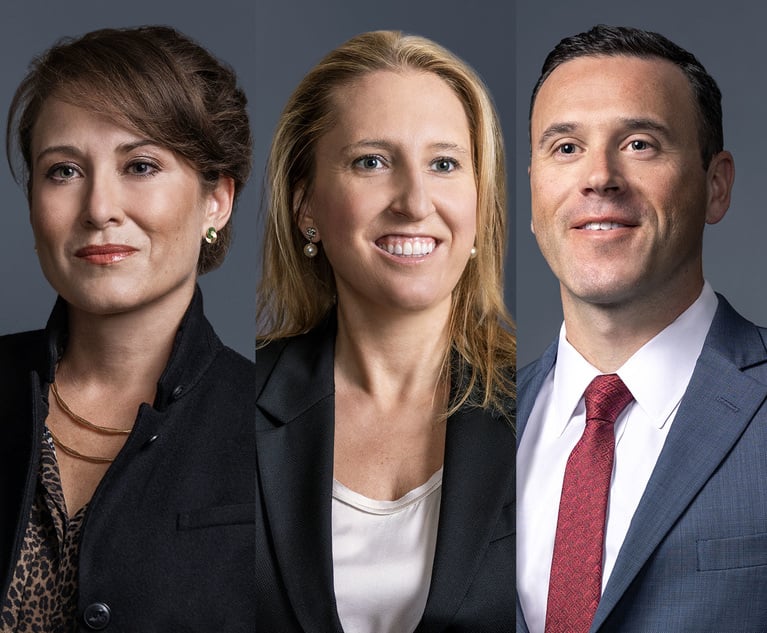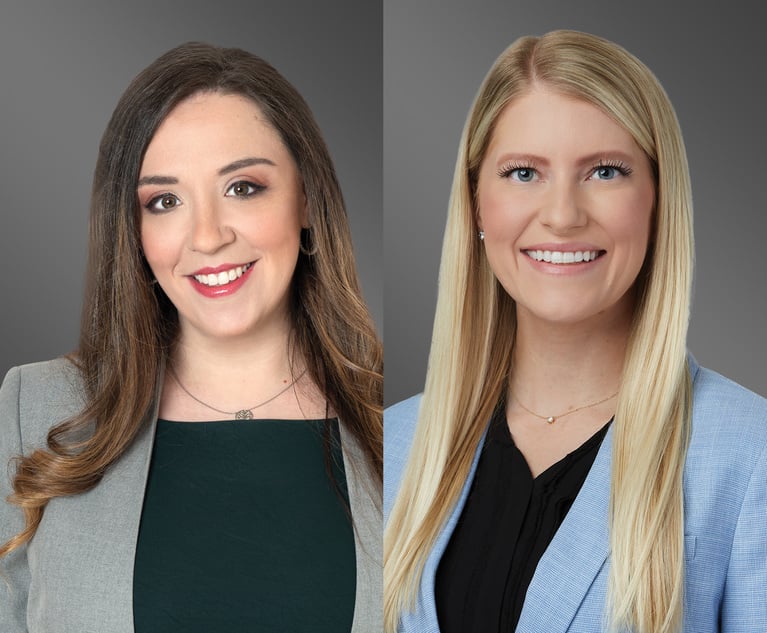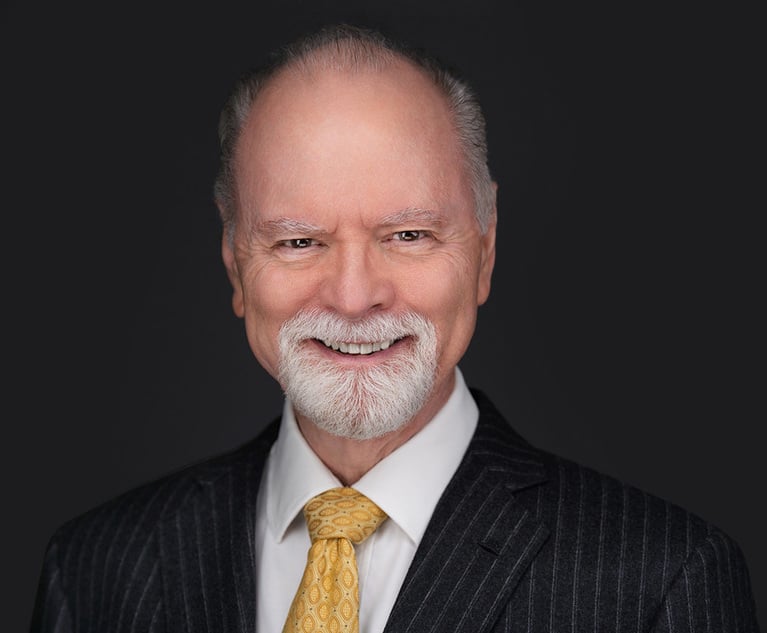On Appeals: If a Court Reporter Isn't There, Is It in the Record?
From the perspective of appellate counsel, the choice is always clear: If you want your appeal decided on the merits, you had better be sure to have a real live reporter present to preserve your words of wisdom.
October 11, 2018 at 12:28 PM
6 minute read
 Charles Kagay
Charles Kagay
If a tree falls in a forest and no one is around to hear it, does it make a sound? Philosophers disagree on the answer to this venerable question, as is their way. But if something is said in a trial court and no reporter is around to record it, you can be sure of the answer: there was no sound. One of the immutable rules of appellate law is that “if it is not in the record, it did not happen.”
In Jameson v. Desta, the California Supreme Court had occasion to reflect on how crucial a verbatim transcript of trial court proceedings can be to an appeal. The presence of a court reporter is so important, the court decided, that inability to pay cannot be a barrier to engaging a reporter in a civil action.
Plaintiff Jameson faced a number of daunting challenges in prosecuting his in pro per medical malpractice action, not the least of which was that he was incarcerated at the time of trial and could participate only by telephone. He was also indigent, which allowed him to litigate in forma pauperis. This overcame some but not all of the financial barriers he faced.
His case was tried in San Diego County Superior Court. That court, like several other California trial courts, no longer provides reporters for civil trials, leaving the parties to bring in their own reporters at their own expense. Courts that still do provide reporters can and do charge the parties a fee for this service. If the San Diego court had provided a reporter, Jameson would have been entitled to a waiver of the fee because of his indigent status. But because the court did not provide this service, he was out of luck. Defendant did not engage a reporter, Jameson could not afford one, and the trial proceeded unreported.
A jury was empaneled, the parties gave opening statements, and the judge then granted defendant's nonsuit motion. Jameson appealed. The Court of Appeal acknowledged that Jameson raised several legal arguments that might show that the trial court had erred in granting nonsuit. But it found none of them cognizable in the absence of a reporter's transcript, and so affirmed.
The California Supreme Court granted review to address the superior court's policy of not providing an official court reporter in a civil case for a party who has qualified for a fee waiver, while giving a party who can afford to hire a private reporter the option of bringing one in. The court concluded that the principles underlying California's in forma pauperis doctrine require a superior court with such a policy to assure the availability of a verbatim record of court proceedings to indigent civil litigants.
In so ruling, the court illustrated at length the vital importance of a reporter's transcript on appeal. In particular, the court noted that “the absence of a court reporter at trial court proceedings and the resulting lack of a verbatim record of such proceedings will frequently be fatal to a litigant's ability to have his or her claims of trial court error resolved on the merits by an appellate court.” This is because all presumptions on appeal ordinarily go to the respondent, and these can be overcome only if appellant can point to a contrary showing in the record. If the record is inadequate, the appellant loses by default.
The court noted that many states have attempted to ameliorate these problems by allowing electronic recording of trial court proceedings. But, as the court further observed, California has legislatively restricted such recording to limited jurisdiction civil matters and to criminal proceedings involving misdemeanors or infractions. Proposals to loosen these restrictions appear to have strong political opponents, including the California Official Court Reporters Association and the Service Employees International Union. And trial lawyers recognize the value of a human court reporter who can make them look good by ignoring all the uhs, hmms, and y'knows that an electronic recording would enshrine for all time.
The court acknowledged that appeals can sometimes be resolved on the clerk's transcript (papers filed in the trial court) or on a settled or agreed statement (a summary of oral proceedings crafted by the trial court or by party agreement). However, it emphasized that the circumstances in which these substitutes are useful are limited and often cannot be predicted in advance. And, no matter what, the party with the means to pay for a private reporter would always enjoy an advantage over the indigent party just by virtue of having the option.
Sometimes the absence of a verbatim transcript can even work against respondent. I was once engaged by a losing party's malpractice attorney to appeal the judgment from a trial conducted without a reporter. His theory was that it had been malpractice by the trial attorney not to request a reporter because this had made the appeal futile, but he thought he still needed to have an appeal filed as a formality to show that his client had made an effort to mitigate the malpractice damages. As it happened, I wound up getting most of the judgment reversed through the use of a settled statement. One reason was that the settled statement failed to show substantial evidence in support of several crucial factual conclusions. The lack of substantial evidence is usually a very difficult point to establish on a full transcript, but in this case it was glaringly apparent on the face of the terse settled statement. This result was good for the client—even though it took a lot of wind out of the sails of the malpractice action.
And so, whether to have a reporter present at trial can be a strategic choice for a trial lawyer, a choice now available to the indigent civil litigant. From the perspective of your appellate counsel, though, the choice is always clear: If you want your appeal decided on the merits, you had better be sure to have a real live reporter present to preserve your words of wisdom.
On Appeals is a monthly column by the attorneys of the California Appellate Law Group, an appellate boutique with offices in San Francisco and Los Angeles. Charles Kagay is of counsel with the firm. He has decades of experience handling appeals that involve complex or novel legal questions and is certified by the State Bar as a California appellate specialist. Find out more about Charles and the California Appellate Law Group at www.calapplaw.com.
This content has been archived. It is available through our partners, LexisNexis® and Bloomberg Law.
To view this content, please continue to their sites.
Not a Lexis Subscriber?
Subscribe Now
Not a Bloomberg Law Subscriber?
Subscribe Now
NOT FOR REPRINT
© 2025 ALM Global, LLC, All Rights Reserved. Request academic re-use from www.copyright.com. All other uses, submit a request to [email protected]. For more information visit Asset & Logo Licensing.
You Might Like
View All
M&A Transactions and AB 1824: Navigating New Privacy Compliance Challenges
7 minute read
What Will It Mean in California if New Federal Anti-SLAPP Legislation Passes?
9 minute readTrending Stories
- 1Uber Files RICO Suit Against Plaintiff-Side Firms Alleging Fraudulent Injury Claims
- 2The Law Firm Disrupted: Scrutinizing the Elephant More Than the Mouse
- 3Inherent Diminished Value Damages Unavailable to 3rd-Party Claimants, Court Says
- 4Pa. Defense Firm Sued by Client Over Ex-Eagles Player's $43.5M Med Mal Win
- 5Losses Mount at Morris Manning, but Departing Ex-Chair Stays Bullish About His Old Firm's Future
Who Got The Work
J. Brugh Lower of Gibbons has entered an appearance for industrial equipment supplier Devco Corporation in a pending trademark infringement lawsuit. The suit, accusing the defendant of selling knock-off Graco products, was filed Dec. 18 in New Jersey District Court by Rivkin Radler on behalf of Graco Inc. and Graco Minnesota. The case, assigned to U.S. District Judge Zahid N. Quraishi, is 3:24-cv-11294, Graco Inc. et al v. Devco Corporation.
Who Got The Work
Rebecca Maller-Stein and Kent A. Yalowitz of Arnold & Porter Kaye Scholer have entered their appearances for Hanaco Venture Capital and its executives, Lior Prosor and David Frankel, in a pending securities lawsuit. The action, filed on Dec. 24 in New York Southern District Court by Zell, Aron & Co. on behalf of Goldeneye Advisors, accuses the defendants of negligently and fraudulently managing the plaintiff's $1 million investment. The case, assigned to U.S. District Judge Vernon S. Broderick, is 1:24-cv-09918, Goldeneye Advisors, LLC v. Hanaco Venture Capital, Ltd. et al.
Who Got The Work
Attorneys from A&O Shearman has stepped in as defense counsel for Toronto-Dominion Bank and other defendants in a pending securities class action. The suit, filed Dec. 11 in New York Southern District Court by Bleichmar Fonti & Auld, accuses the defendants of concealing the bank's 'pervasive' deficiencies in regards to its compliance with the Bank Secrecy Act and the quality of its anti-money laundering controls. The case, assigned to U.S. District Judge Arun Subramanian, is 1:24-cv-09445, Gonzalez v. The Toronto-Dominion Bank et al.
Who Got The Work
Crown Castle International, a Pennsylvania company providing shared communications infrastructure, has turned to Luke D. Wolf of Gordon Rees Scully Mansukhani to fend off a pending breach-of-contract lawsuit. The court action, filed Nov. 25 in Michigan Eastern District Court by Hooper Hathaway PC on behalf of The Town Residences LLC, accuses Crown Castle of failing to transfer approximately $30,000 in utility payments from T-Mobile in breach of a roof-top lease and assignment agreement. The case, assigned to U.S. District Judge Susan K. Declercq, is 2:24-cv-13131, The Town Residences LLC v. T-Mobile US, Inc. et al.
Who Got The Work
Wilfred P. Coronato and Daniel M. Schwartz of McCarter & English have stepped in as defense counsel to Electrolux Home Products Inc. in a pending product liability lawsuit. The court action, filed Nov. 26 in New York Eastern District Court by Poulos Lopiccolo PC and Nagel Rice LLP on behalf of David Stern, alleges that the defendant's refrigerators’ drawers and shelving repeatedly break and fall apart within months after purchase. The case, assigned to U.S. District Judge Joan M. Azrack, is 2:24-cv-08204, Stern v. Electrolux Home Products, Inc.
Featured Firms
Law Offices of Gary Martin Hays & Associates, P.C.
(470) 294-1674
Law Offices of Mark E. Salomone
(857) 444-6468
Smith & Hassler
(713) 739-1250








